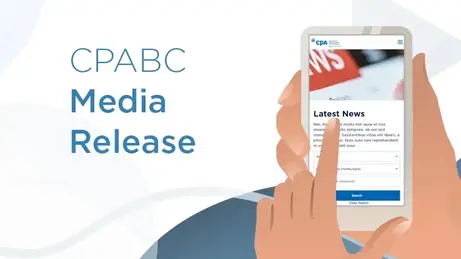
As part of CPABC’s commitment to protecting the public interest, we require that all members who offer professional accounting services to the public be properly licensed by CPABC and carry adequate professional liability insurance.
On occasion, we’ve become aware of CPAs engaging in public practice without the appropriate licensing. Accordingly, this article aims to clarify the definition of public practice, explain the licensing requirements, and offer additional guidance to help members stay onside.
What constitutes “public practice”?
The term public practice covers a broad range of services. CPABC Bylaw 100 defines it as “…offering to provide public accounting services or other regulated services to the public.” Public accounting services include audit, review, and other assurance engagements, compilation engagements, and certifications, declarations, opinions, or reports, while other regulated services include summarizations, analyses, forensic accounting, and taxation-related or statutory filing work (e.g., GST, PST, and payroll services).
A comprehensive list of these services is available at bccpa.ca under Member & Practice Regulation > Public Practice > Public Practice Licensing. On the same page, you’ll find an illustration of CPABC’s public practice licensing framework, which outlines the following categories of licence, as defined in the CPABC Bylaw Regulations:
- Audit (public and/or non-public companies);
- Review;
- Compilation; and
- Other regulated services, such as tax, fractional controllership, and forensic accounting.
The type of licence a member may obtain depends on the nature of the services they intend to provide, as well as their education and experience. For example, if you wish to be licensed to prepare tax returns, CPABC will assess whether you have the proper experience and training, and whether you’ve taken the appropriate professional development courses in taxation.
Nuances to consider when…
Performing bookkeeping services
Does bookkeeping fall under the umbrella of public practice? While you do not have to be licensed in public practice to provide basic bookkeeping services, a licence is necessary if you also prepare statutory filings such as GST/PST returns, WorkSafeBC reports, or tax filings (like T4 slips and summaries). Additionally, you must be appropriately licensed if you’re offering more advanced services, including financial statement preparation, summarization, or analysis.
Using the CPA designation
Licensing requirements are based on the nature of the services provided and not simply on whether the CPA designation is used. A CPABC member cannot avoid licensing obligations by choosing to not present themselves as a CPA or by omitting their designation from a document. Conversely, if a CPA member uses the title “Chartered Professional Accountant” or “CPA” in their business name or service descriptions, they are deemed to be providing public practice services, as defined by Rule 402.1 of the CPABC Code of Professional Conduct (CPA Code).
“Dabbling”
We have seen cases of unauthorized practice where CPAs—sometimes between jobs or seeking additional income—begin offering services on a casual basis. What may begin as a small side venture can quickly grow into a full-scale business.
It should be noted that licensing is mandatory whether you’re serving one client or 100. The only exception is if you’re providing accounting services (such as tax return preparation) for immediate family, because immediate family members are not considered part of the “public.” Friends, however, are considered members of the public, so offering professional accounting services—even to just one friend—requires a public practice licence.
Wearing several hats
In recent years, CPABC’s public practice licensing department has seen a growing number of inquiries from members who—although already employed at public practice firms—want to obtain their own public practice licences to launch side businesses.
While this is not prohibited under the CPABC Bylaws, members are strongly advised to carefully review the terms of any employment or contractual agreements they’ve signed first, as these agreements may restrict outside business activities and/or identify specific expectations regarding competition, time commitments, and the use of company resources.
You are also reminded of your obligations under the CPA Code, particularly Rule 208 (Confidentiality of information) and Rule 210 (Conflicts of interest).
Holding multiple CFO/controllership roles
Another emerging area of concern involves CPAs working as part-time or contract CFOs for multiple clients. While supporting several startups in this way may seem informal and/or expedient, acting as a CFO for more than one entity typically falls under the definition of public practice, meaning that a licence is required.
Performing volunteer or pro bono work
Licensing requirements may apply regardless of the volume of services you provide and whether you charge for them. Providing services on a pro bono basis or as a personal favour may still constitute public practice.
An exemption applies for a member who prepares tax returns for free through an organized volunteer tax clinic as part of the Canada Revenue Agency’s Community Volunteer Income Tax Program; however, the member must apply for the exemption from public practice licensure each year through CPABC’s Online Services site and must register as a volunteer with the Canada Revenue Agency online.
Serving clients in other jurisdictions
If you have clients in other jurisdictions, additional licensing requirements may apply. As licensing requirements vary by province and outside of Canada, you are strongly encouraged to contact the relevant accounting regulatory body to determine whether a local practice licence is required.
Contemplating retirement
If you’re a CPA in public practice who is transitioning into retirement, note that you must maintain your licence even if you plan to start providing services on a part-time basis. It’s only once you’ve fully retired that you will no longer need a practice licence.
Professional liability insurance is another matter, however, as claims by former clients can arise years after retirement. Without insurance, you could be held personally responsible for damages if you’re sued for professional negligence—putting you at serious financial risk at a time when you are most financially vulnerable.
That’s why CPABC Bylaw Regulation 1301/1(5) requires members to maintain adequate insurance coverage for at least six years after leaving public practice. This type of coverage—known as “discovery,” “tail,” or “extended reporting period” insurance—protects you in your retirement; it also protects your former clients in the case of successful claims.
Do you need guidance?
We recognize that the scope of public practice is considerable, and we’re here to help. You can consult CPABC’s professional standards advisors for confidential guidance to ensure that you stay compliant with the CPA Code and the CPABC Bylaws—particularly when navigating difficult situations. Contact our advisors by email at professionaladvisory@bccpa.ca.
Additionally, once you have applied for a public practice licence, you are welcome to contact the public practice licensing department at publicpracticelicensing@bccpa.ca.
This article was originally published in the July/August 2025 issue of CPABC in Focus.
